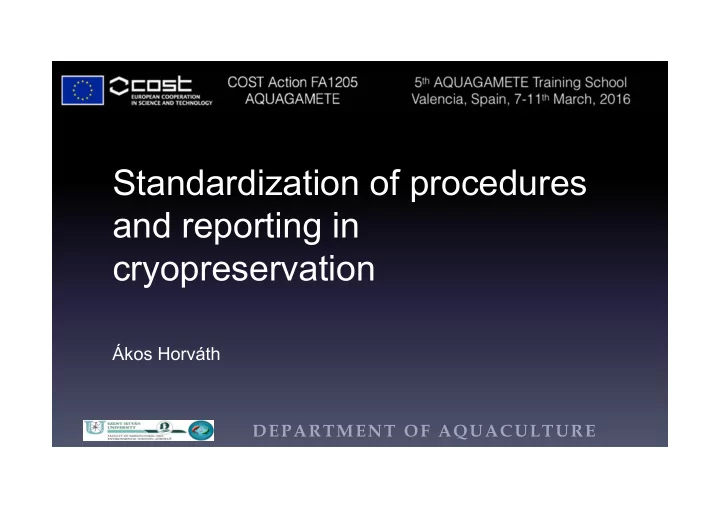

Standardization of procedures and reporting in cryopreservation Ákos Horváth DEPARTMENT OF AQUACULTURE
Overview • Why are we cryopreserving sperm? • Identification of the problem • Possible solutions to the problem • Does standardization limit scientific freedom? DEPARTMENT OF AQUACULTURE
Why do we develop methods? • To be used in aquaculture practice – to assist reproduction in aquaculture – to be applied to selective breeding programs – to be applied to conservation of genetic resources DEPARTMENT OF AQUACULTURE
Use of cryopreservation methods in aquaculture • Very limited • Applied on an individual basis • Reasons: – sperm is seldom a limiting factor – limited use of selective breeding – lack of standardization DEPARTMENT OF AQUACULTURE
Standardization problems Publication Replication Method problems development Rejection by industry DEPARTMENT OF AQUACULTURE
Standardization problems • Definitions • Methods • Publications DEPARTMENT OF AQUACULTURE
Typical problems • Extenders • Dilution ratios • Cryoprotectant concentrations DEPARTMENT OF AQUACULTURE
Problems with definitions • Extenders – What is an extender? • Cryoprotectant concentrations – In percentages or molars? – Relative to the final dilution or to the extender? • Dilution ratios – Are they meaningful? – Sperm as a substance or sperm as a concentration of cells DEPARTMENT OF AQUACULTURE
Problems with methods DEPARTMENT OF AQUACULTURE
Problems with methods • Sperm concentration determination – Which method to use? • Sperm cryopreservation methods – Equilibration – Handling of straws – Polystyrene box or controlled-rate freezer • Calculation of fertilization and hatch rates DEPARTMENT OF AQUACULTURE
Problems with methods • Osmolality measurements – Wapor pressure or freezing point- depression osmometer? • CASA measurements DEPARTMENT OF AQUACULTURE
Problems with publication • Lack of guidelines or good laboratory practices • Lack of standard procedures • Lack of definitions DEPARTMENT OF AQUACULTURE
Problems with the industry • Standards exist but are they applicable to aquaculture? • Lack of branding • Lack of quality control DEPARTMENT OF AQUACULTURE
Is there really a problem with the industry? DEPARTMENT OF AQUACULTURE
Standardization • Standardization of definitions • Standardization of protocols • Standardization of reporting DEPARTMENT OF AQUACULTURE
Standardization of definitions DEPARTMENT OF AQUACULTURE
Standardization of definitions DEPARTMENT OF AQUACULTURE
Standardization of protocols DEPARTMENT OF AQUACULTURE
Standardization of protocols DEPARTMENT OF AQUACULTURE
Standardization of reporting DEPARTMENT OF AQUACULTURE
Example: standardization for high-throughput cryopreservation of hybrid catfish (E Hu, High-throughput sperm cryopreservation of aquatic species, PhD Dissertation, Louisiana State University, 2012) DEPARTMENT OF AQUACULTURE
Example: standardization for high-throughput cryopreservation of hybrid catfish (E Hu, High-throughput sperm cryopreservation of aquatic species, PhD Dissertation, Louisiana State University, 2012) DEPARTMENT OF AQUACULTURE
Example: standardization for high-throughput cryopreservation of hybrid catfish (E Hu, High-throughput sperm cryopreservation of aquatic species, PhD Dissertation, Louisiana State University, 2012) DEPARTMENT OF AQUACULTURE
Acceptance by scientists • Does it limit scientific freedom? • Do I have to follow the published protocols? DEPARTMENT OF AQUACULTURE
Acceptance by scientists • Scientific freedom sloppy reporting • No application without standardization • Standard terms can be used as a reference and a starting point DEPARTMENT OF AQUACULTURE
Recommend
More recommend